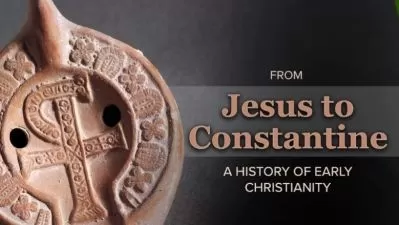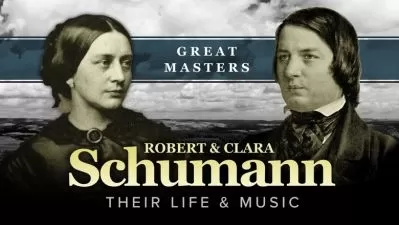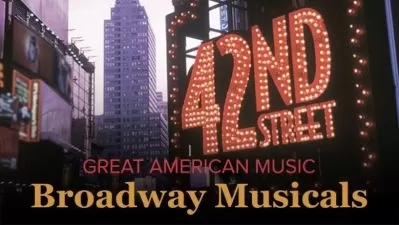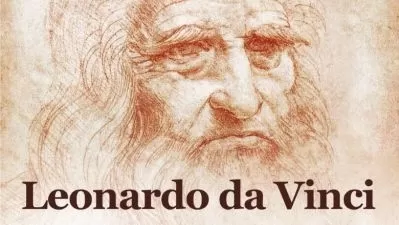Music as a Mirror of History
Robert Greenberg
16:48:56
Description
“What I write is my commentary on what is happening around me… my music is my commentary.” Henryk Górecki
In the worlds of painting and literature, it’s easy to see where history and art intersect. In Picasso’s Guernica or Tolstoy’s War and Peace, it’s evident how works of art mirror and participate in the life of their times, sometimes even playing a role in historical events.
But what about music? What is the intersection—if any—between the influential works of Western concert music and the historical times that surrounded them?
In Music as a Mirror of History, Great Courses favorite Professor Robert Greenberg of San Francisco Performances returns with a fascinating and provocative premise: Despite the abstractness and the universality of music—and our habit of listening to it divorced from any historical context—music is a “mirror” of the historical setting in which it was created. Indeed, certain works of music do not just mirror the general spirit of their time and place, but can even explicitly evoke specific historical events. As Professor Greenberg demonstrates in this course, music carries a rich spectrum of social, cultural, historical, and philosophical information, all grounded in the life and experience of the composer—if you’re aware of what you’re listening to. In these lectures, you’ll explore how composers convey such explicit information, evoking specific states of mind and giving voice to communal emotions, all colored by their own personal experience. Music lovers and history enthusiasts alike will be enthralled by this exploration of how momentous compositions have responded to—and inspired—pivotal events.
Consider the following:
- The writing of Handel’s celebrated Water Music (1714) was intimately connected with the incredible story of how a German prince of Brunswick-Lüneberg became King George I of England—whose patronage of Handel produced a series of masterpieces created to glorify the English royal court.
- Frédéric Chopin’s iconic Revolutionary Etude for piano (1831) was written in the composer’s dark despair over a failed uprising in Warsaw against Poland’s Russian overlords, an event which left a permanent mark on the character of Chopin’s music.
- Aaron Copland’s Symphony No. 3 (1946) expresses the euphoric postwar spirit of the American people, victorious after both the Great Depression and a globe-spanning battle against fascism.
In this unique and eye-opening course, Professor Greenberg presents an in-depth survey of musical works that were written in direct response to contemporary historical events—events that both shaped the composers’ lives and inspired the creation of the works in question. In a novel departure from his previous courses, which explore how classical masterpieces work as music per se, here Professor Greenberg reveals, in stunning and poignant detail, the ways in which history influenced some of the great (and not so great!) works of music, and how they in turn influenced history.
Ranging widely across the 18th, 19th, and 20th centuries, the lectures immerse you in historical moments such as the French Revolution, the Napoleonic Wars, the Austrian-Ottoman conflict, the Hungarian nationalist movement, the movement for Italian unification, the economic ascent of the U.S., the Stalinist regime in the USSR, and World Wars I and II. Across the arc of the course, you’ll see how these events were felt and expressed in the music of Mozart, Beethoven, Berlioz, Brahms, Verdi, Wagner, and many others, including modern masters such as Janáček, Górecki, and Crumb.
Incorporating superlative musical excerpts in each lesson, these 24 sumptuously detailed lectures offer you a revelatory look at history through the lens of music. The result is deep and enlightening insight into both, and a view of the remarkable interface between the events of history and a musical repertoire which stands among the most sublime creations of our civilization.
A Vividly Different Window on Music—and on History
This is as much a course about history as it is about music, and anyone with an interest in history will find it both enthralling and richly informative. The course reminds us that history is not only available to us through the study of events, but also through many diverse forms of human expression, including great music. For example, Mozart’s Abduction from the Harem vividly reflects Europe’s centuries-long conflict and simultaneous fascination with the Ottoman Empire, and you’ll find this in both the opera’s text and in Mozart’s use of specific, stereotypically “Turkish” musical devices and figurations.
To know the historical context of these great works opens up an entirely new level of understanding and appreciation of music—music that was meant to be not only aesthetically and spiritually satisfying, but also socially, historically, and politically meaningful.
At the heart of the inquiry, you’ll discover how history and music intertwine in works such as:
- Beethoven’s Farewell Sonata (1810): Witness the dramatic unfolding of the French Revolutionary Wars, and the escalating military conflicts that pitted Napoleon against the Austrian Habsburg Empire. Observe how this great sonata for piano expresses Beethoven’s range of emotions over the absence of his esteemed patron as Napoleon’s army vanquished Vienna.
- Berlioz and de L’isle’s La Marseillaise (1830): Trace the complex and colorful history that made Paris the hotbed of European revolutionary activity. Learn how Rouget de L’isle’s beloved marching song La Marseillaise echoed across France from 1792 to the anti-Bourbon revolution of 1830, when Hector Berlioz set it epically for double chorus, children’s choir, and extended orchestra.
- Verdi’s Nabucco (1842): Discover the historic events that linked Verdi’s 1842 opera inextricably with the Italian movement for unification, and consider how the Italian people’s passionate embrace of Verdi’s music swept the composer into a reluctant but ultimately committed role as a politician in the birth of the Italian nation.
- Gottschalk’s The Union (1862): Enter the life of one of the most dazzling and outlandish of American composers—that of Louis Moreau Gottschalk, a world-conquering piano virtuoso, composer of genius, and fierce anti-slavery advocate during the Civil War, whose unflagging efforts on behalf of the Northern cause included this galvanizing, patriotic concert piece.
- Rimsky-Korsakov’s The Golden Cockerel (1907): Uncover how Rimsky-Korsakov’s classic opera functioned as thinly-veiled political polemic, and grasp how both its allegorical narrative and musical setting mocked and satirized the Russian military’s disastrous defeat by the Japanese in 1905, the iron hand of the Imperial government, and the beleaguered figure of Tsar Nicholas II.
- George Crumb’s Black Angels (1970): Trace the genesis of this contemporary masterpiece in the Cold War political maneuvering that led the U.S. into Vietnam and an era of bitter protest. In Crumb’s visionary string quartet, experience the composer’s searing musical language that evokes the battlefield horrors and the American public’s sense of waste and grief.
A One-Of-A-Kind Learning Experience
The unique manner of inquiry of this course offers you an analysis of history that is not available anywhere else—an analysis that synthesizes two fields of knowledge with astonishing detail and depth, requiring an expert historian, on the one hand, and an expert musicologist, on the other. As the lectures consistently reveal, Professor Greenberg is both.
In the lecture on Mily Balakirev’s Symphony No. 1, you’ll observe how the 19th–century Russian movement toward “expository” music writing, as well as rejection of pre-existing musical forms, was profoundly linked to notions of the Russian “national character”—an example, as Professor Greenberg says, of how “a musical syntax can become part of a national myth.” Later, you’ll take the measure of the nightmare of Stalinism, and of how Shostakovich’s Symphony No. 13 expresses the experience of the millions who were destroyed by the regime. And, in Henryk Górecki’s heartbreakingly beautiful “Symphony of Sorrowful Songs,” you’ll see how the composer used ancient musical material with deep cultural resonance—history in sound—to reflect unforgettably on the modern tragedy that befell Poland in World War II.
Standing on the shoulders of Professor Greenberg’s catalogue of celebrated courses, Music as a Mirror of History offers further compelling insights into our musical tradition. By demonstrating the deep interconnections between lived human experience—that is, history—and musical expression, Professor Greenberg speaks incisively to both the nature of great art, and to what is perhaps the greatest gift of the art form in question: the ability of music to speak to dimensions of our awareness that are unreachable by words or visual symbols.
In Music as a Mirror of History, you’ll explore how music, in its singular capacity to evoke and reflect experience, can bring us not only transcendent beauty and joy, but also understanding, compassion, and meaning amid even the most terrible of human events. Join us for an unparalleled look into the power and scope of musical art.
More details
User Reviews
Rating
Robert Greenberg
Instructor's CoursesDr. Robert Greenberg is Music Historian-in-Residence with San Francisco Performances. A graduate of Princeton University, Professor Greenberg holds a Ph.D. in Music Composition from the University of California, Berkeley. He has seen his compositions—which include more than 45 works for a wide variety of instrumental and vocal ensembles—performed all over the world, including New York, San Francisco, Chicago, Los Angeles, England, Ireland, Greece, Italy, and the Netherlands.
He has served on the faculties of the University of California, Berkeley; California State University, Hayward; and the San Francisco Conservatory of Music, and has lectured for some of the most prestigious musical and arts organizations in the United States, including the San Francisco Symphony, the Lincoln Center for the Performing Arts, the Van Cliburn Foundation, and the Chicago Symphony. For The Great Courses, he has recorded more than 500 lectures on a range of composers and classical music genres.
Professor Greenberg is a Steinway Artist. His many other honors include three Nicola de Lorenzo Composition Prizes and a Koussevitzky commission from the Library of Congress. He has been profiled in various major publications, including The Wall Street Journal; Inc. magazine; and the London Times.
You can find more music content from Robert Greenberg on Patreon: https://www.patreon.com/RobertGreenbergMusic.

The Great Courses
View courses The Great Courses- language english
- Training sessions 22
- duration 16:48:56
- English subtitles has
- Release Date 2023/04/29






















